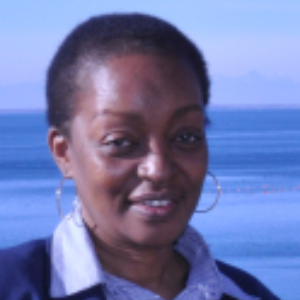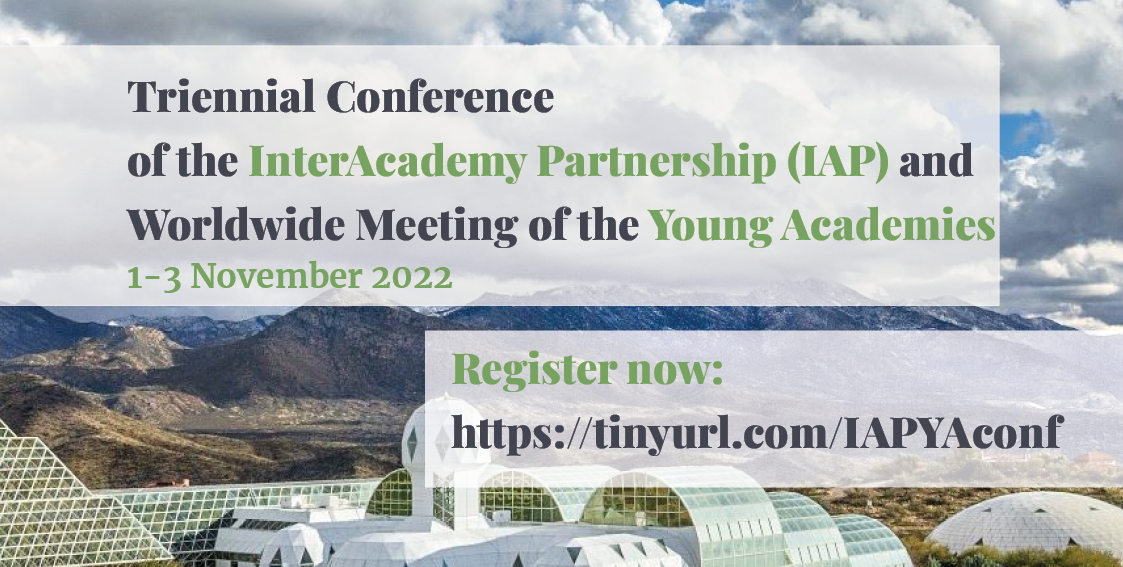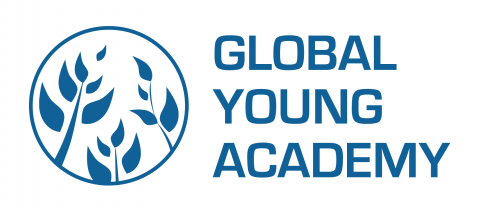2022 IAP Conference and General Assembly
Overview
Every three years the member academies of the InterAcademy Partnership (IAP) and its regional networks get together to elect IAP leadership, welcome new members and discuss how science can help advancing sound policies, improve public health, promote science excellence and achieve other critical development goals.
In 2022, both events will take place online and at Biosphere 2, Arizona, USA.
To find more information about these events, please click on one webpages of
- the 2022 IAP General Assembly and
- the Triennial Conference of the InterAcademy Partnership (IAP) and the Worldwide Meeting of the Young Academies.
IAP member academies nominated participants to attend both events. The number of in-person participants is restricted based on COVID-19 policies and due to the limited accommodation available at the venue. For more information please contact iap@twas.org.
We respectfully acknowledge the University of Arizona is on the land and territories of Indigenous peoples. Today, Arizona is home to 22 federally recognized tribes, with Tucson being home to the O’odham and the Yaqui. Committed to diversity and inclusion, the University strives to build sustainable relationships with sovereign Native Nations and Indigenous communities through education offerings, partnerships, and community service.
The General Assembly of the InterAcademy Partnership (IAP)
The 2022 IAP General Assembly will take place online and at Biosphere 2, Arizona, USA, on 3 November.
This IAP General Assembly will follow the consultative process that begun with the IAP General Assembly in Songdo, Korea in April 2019, and that led to IAP’s member academies endorsing a new set of Statutes that will govern the organization.
Under the new Statutes, the governance structure has been streamlined to maximize the effectiveness, impact and inclusiveness of IAP. Among the more substantive changes made is a new Advisory Committee that will replace the separate Science Executive Committee, Health Executive Committee and Policy Board as strategic advisors to the IAP Board (the 6 co-chairs).
The Triennial Conference of the InterAcademy Partnership (IAP) and the Worldwide Meeting of the Young Academies
The Triennial Conference of the InterAcademy Partnership (IAP) and the Worldwide Meeting of the Young Academies will take place online and at Biosphere 2, Arizona, USA, on 1-3 November 2022.
The theme of the conference will be 'Inclusive Excellence: Harnessing knowledge for sustainable societies' and will be hosted by the U.S. National Academy of Sciences (NAS) and the Royal Society of Canada (RSC) and co-organized by IAP, the Global Young Academy (GYA), NAS, RSC, the RSC College, and the NAS New Voices Program.
This conference, which will bring together the world’s leading senior and young science academies, provides a significant opportunity to rethink our research structures – from involvement to engagement. Inclusive excellence is a concept that promotes equitable and sustainable research processes. It recognizes that the prosperity and wellbeing of communities, particularly when facing major challenges, depends on valuing, engaging, and including the rich diversity of all members. Attacks on the legitimacy of science (all disciplines) during the present pandemic have thrown into sharp relief our need to rethink research processes in ways that make them more inclusive, responsive, and productive.
Our 2022 hybrid meeting will unite a range of delegates from over 100 countries, and this gathering offers us an incredible opportunity to consider – in critical ways – how the present research structures exclude valuable voices and knowledge systems. Enabling the diversification of our research communities needs to be prioritized. The young academy movement is an important illustration of inclusive excellence, and within many of them are good examples of how we might imagine new research frameworks that make space for those traditionally excluded.
Thus, this conference will enable us to explore how to achieve greater diversity of our research circles. We must lead by example and engage with the core principle of the United Nations’ Sustainable Development Goals (UN’s SDGs) – leaving no one behind. Making inclusive excellence a priority for the global research community will eliminate the barriers to research, development, and innovation.
In addition to dedicated sessions focused on major IAP and GYA/young academy projects, there will be 4-5 sessions selected from proposals, submitted from senior and young academies, that provide concrete examples of the power of inclusive excellence frameworks to help address global challenges such as climate change, pandemic preparedness, and improving human health and education accessibility. Session proposals that illustrate how inequities in our academic institutions may be addressed are also sought. Proposals should address at least one aspect of inclusive excellence, such as diversity, inclusion, sense of belonging, equity, accessibility, community engagement and open access to data/science/information. Proposals that include several academies, including collaborative proposals from young and senior academies are encouraged. The format of the session could be a panel with Q&A or an interactive moderated discussion.
The deadline to submit a session proposal was 30 January 2022. Please contact the IAP secretariat (secretariat@iapartnership.org) with any questions.
Conference Summary
Inclusive Excellence: Harnessing knowledge for sustainable societies
The InterAcademy Partnership’s (IAP) Triennial Conference took place on 1-3 November 2022 as a hybrid event, with in-person participation at Biosphere 2, Arizona. The event was hosted by the U.S. National Academy of Sciences (NAS) and the Royal Society of Canada (RSC) and was co-organized by IAP, the Global Young Academy (GYA), the U.S. National Academies of Sciences, Engineering, and Medicine, RSC, the RSC College, and the NAS New Voices Program. The theme of the conference was ‘Inclusive Excellence: Harnessing knowledge for sustainable societies.’ The conference consisted of a plenary session and thematic sessions that engaged over 80 speakers from around the globe. More than half of the speakers were women and 30 were from low- and middle-income countries (LMICs). This conference was the first IAP event to be co-organized by senior and early to mid-career scientists.
Fostering access to science, technology and innovation (STI) can increase productivity and economic growth; promote health; achieve food security through sustainable and equitable agricultural systems; promote renewable energy; and mitigate climate change. The IAP conference explored how, in recent decades, unequal access to advances in STI and therefore benefits from these advances, threatens the sustainability of societies globally. Conference participants discussed several key factors that contribute to unequal benefits from advances in STI. These included: access to science education and academic inclusion; access to digital technologies; representation of women, racial minorities, and persons with disabilities in science and policy decisions; and scientific publishing practices. Conference sessions addressed these issues holistically, looking across the disciplines of science, medicine and engineering.
Science education and academic inclusion: Science career readiness and global competitiveness starts with high-quality Science, Technology, Engineering and Mathematics (STEM) education for all school-age children. Inquiry-based science education, along with access to science centres and science museums, can provide children K-12 with knowledge and skills to solve problems and help make decisions now and in the future that lead to the development of sustainable societies. (See session titled: ‘Inquiry-based Science Education for Sustainable Development: Leaving no one behind’). Many higher education settings have traditionally excluded minority groups and have employed evaluation practices that uphold inequities at multiple points along academic progression. As highlighted in the session titled ‘Winning from Greater Inclusion: Relation between diversity and academic culture’ there must be an acknowledgement of biases in academic cultures and initiatives to solve structural problems in order to achieve effective and excellence-inspiring academic cultures. Ensuring a healthy global research ecosystem requires the input and commitment from all stakeholders. The session on ‘Inclusive Excellence for Sustainable Societies: Making space for at-risk and displaced scholars’ addressed the issue of recognizing the damage that war, conflict, sanctions and threats of violence have on individual researchers as well as their institutions.
Digital technology: During the Covid-19 pandemic, use of modern technology such as the internet of things, and information sharing both at global and local levels increased significantly. (See session titled: ‘Bridging Generations and Scientific Disciplines in Pandemic-fueled Innovations: Learning from the COVID-19 pandemic experience’.) As societies adapt to the global impacts of the pandemic, academic practices also evolve to increase accessibility, intersectional inclusion and sustainability. (See session titled: ‘Preparing Academia for the Future of Collaboration: Opportunities and barriers’.) However, there are well-recognized inequalities in access to digital technology including to devices and the internet and this inequality – often referred to as digital divide – creates inequality in access to information and resources. Isabelle Alice Zaugg, Columbia University, USA, spoke on this issue and in particular how translation features found on the internet focus on only a few of the world’s languages to the exclusion of hundreds of others.
Digital technologies were also to the fore in the fields of health and medicine, where there are growing concerns related to issues such as equity, unequal access, escalating costs and privacy. The session on ‘Societal Implications of Emerging Health Sciences and Technologies: Need for a new governance framework’ called for a cross-sectoral, coordinated framework to guide the development and use of emerging science and technology in health and medicine while mitigating potential undesirable risks.
Women, racial minorities and persons with disabilities in science and policy: In the conference’s keynote address, the Honorable Mary Robinson, former President of Ireland and UN Commissioner for Human Rights, highlighted the need for inclusivity in policy decision-making processes and emphasized the need to ensure that women and historically marginalized groups such as racial minorities are part of decision making. Other sessions echoed the importance of equality in policy-making decisions in different contexts. For example, participants of the session on ‘Climate Change and Health’ noted that women, and especially those in LMICs, are at higher risk of exposure to the effects of climate change, and that several societal, cultural and economic factors contribute to this vulnerability. Yet, gender disparities exist with women having less opportunity to be involved in policy decisions. (See session titled: ‘Inclusion and Participation of Women in Science Academies.’)
The session on ‘Inclusion and Participation of Women in Science Academies’ noted that the membership of many academies comprises less than 20 percent women. Young academies and the GYA boast stronger representation but still are not yet at parity. Although the gender gap is closing in most countries, progress is slower when considering the inclusion of other historically marginalized groups. The session on ‘Winning from Greater Inclusion: Relation between diversity and academic culture’ noted that other key imbalances such as age, ethnicity, race, disabilities, parenthood, resident status, social and economic status, and multidimensional discrimination have so far received less attention, consequently affecting quality of research and research-based policy advice for sustainable societies. The session ‘Science Advice by Young Academies on Critical Issues: Why does it matter?’ additionally emphasized the importance of including early and mid-career scientists in policy decisions.
Regarding inclusion of persons with disabilities, some accessibility practices were introduced during the Covid-19 pandemic, but full adoption is slow. The session on ‘Preparing Academia for the Future of Collaboration: Opportunities and barriers’ discussed online meeting platforms as alternatives to in-person events that often offer closed captioning for those who are hearing impaired but the captioning services are imperfect and often fail to account for accents or languages other than English. In addition, software programs that allow blind or visually impaired users to read text displayed on the screen with a speech synthesizer or other means are not always compatible with common online meeting platforms, making these meetings inaccessible to people with these disabilities.
Scientific publishing practices: Open Science is a movement that aims to make scientific research accessible, efficient and transparent. Practices such as open access publishing are generally viewed favourably by the scientific community to achieve visibility and recognition within the global research system, but implementation of open access publishing practices involves a complex set of issues, especially for researchers from LMICs. For example, complex licensing requirements and technical and other challenges with engaging with data online result in researchers from LMICs having limited access to research papers and data available through open access and creates barriers to them publishing their work and data and making them available to others. Various models for an equitable shift towards open access publishing were proposed and discussed in the session titled ‘How to promote inclusiveness in Open Access publishing models’ including waiving article processing charges (APC) for authors based in low income and lower middle income countries; adapting journals for the digital age by utilizing pre-prints and meta data to focus more on discipline rather than a traditional table of contents; offering assessment rewards for diamond-access publications indexed in databases; and strengthening translation policies and financial support for national and regional journals.
A side-effect of the Open Science movement is the rise in predatory journals and conferences. (See session titled: ‘Combatting Predatory Academic Journals and Conferences: The vital role of senior and young academies’.) Predatory journals and conferences are those that solicit articles and abstracts from researchers through deceitful or misleading practices that exploit the pressure on researchers to publish and present their work. These practices are on the rise and predominantly affect scientists from LMICs and early career scientists. If not addressed, there is a risk of widening the research gap between high-income countries and LMICs, undermining less experienced researchers and compromising the production and use of good research.
Conclusions
Diverse and inclusive groups broaden the range of perspectives and experiences needed to address any challenge and are better at addressing and solving complex problems such as establishing sustainable societies. Opportunities exist to develop sustainable societies by tackling inequality through inclusive STI and actions taken by academies, higher education institutes, governments and the global research community will greatly impact the future. Much like the Declaration adopted at the 2022 World Science Forum (WSF) on ‘Science for Social Justice’ , IAP commits to science as an ongoing tool for social justice and encourages its member academies also to implement the call for action in the WSF Declaration.
The session on ‘Engineering Complex Systems for Climate Change and Energy Transition’ surveyed both technological prospects and the essential systems approaches required to prevent and mitigate the costly consequences of climate change in culturally responsible and socially equitable ways.
Project
Updates
People and Institutions





